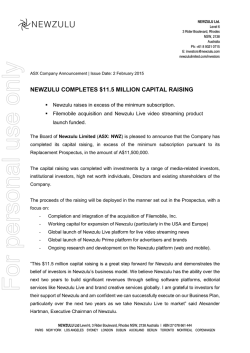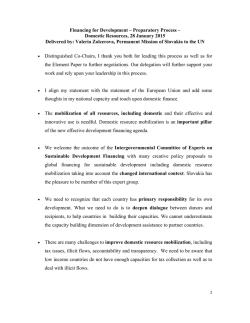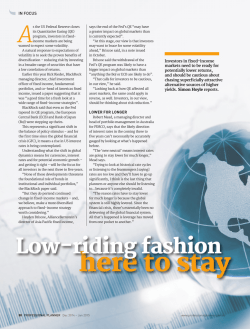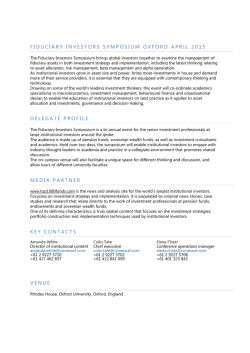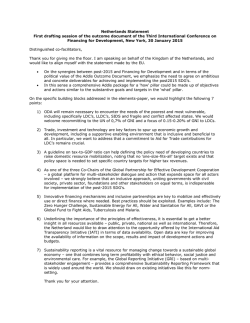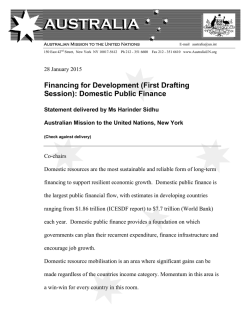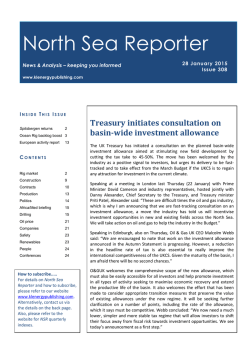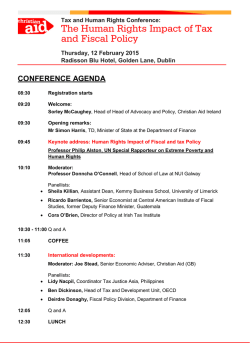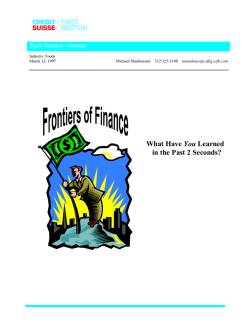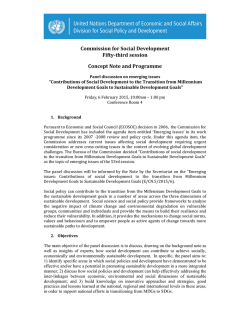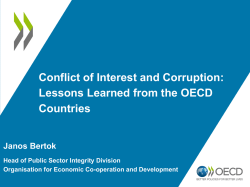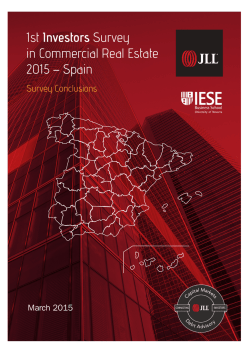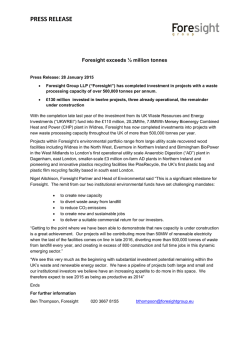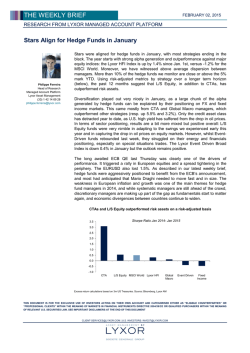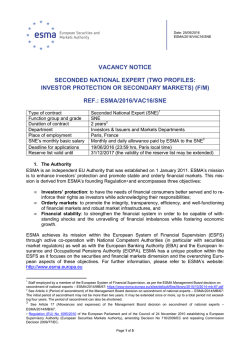
1 OECD-ADBI High-Level Panel on Institutional Investors and Long
Sponsored by the Government of Japan OECD-ADBI High-Level Panel on Institutional Investors and Long-Term Investment Financing Friday, 13 March 2015 Tokyo, Japan DRAFT AGENDA The OECD Project on Institutional Investors and Long-term Investment (the project) aims to facilitate long-term investment (LTI) by institutional investors such as pension funds, insurance companies, and sovereign wealth funds, addressing both potential regulatory obstacles and market failures. The project relies on close co-operation between OECD economies, some non-OECD economies, including G20 and APEC members, major investors, and other key stakeholders. Engaging institutional investors and policy makers will ultimately enable the OECD to develop effective policy recommendations at the highest political level. Work on the project is organised in a series of modules such as data collection, governance, regulation and real assets (i.e. infrastructure). The project looks at both long-term investors (i.e. how institutional investors can be encouraged to act in their long-term capacity, providing stable, counter-cyclical financing and acting as engaged shareholders) and long-term investments (i.e. how to finance infrastructure and other real assets, given the constraints in government, corporate and financial sector balance sheets). This event is being organised to inform and discuss the implications from facilitating long-term investment in the Asian region, and how the region might respond to the broader economic growth agenda by better addressing long-term investment financing. 09:00 – 09:30 Registration of participants 09:30-10:00 KEYNOTE ADDRESS: 10:00 – 11:30 PANEL 1: Investing for the Long-term: Challenges and Opportunities Long-term investment has long been identified as an important contributor to economic growth, both in terms of tangible fixed assets (e.g. equipment, machinery, facilities) and intangibles such as knowledge-based assets. That said, it is difficult to identify ex ante an “optimal” level of investment with any great degree of precision, given the uncertainty surrounding future levels of relevant variables such as demand for particular products and services. Experience suggests that there can be considerable economic dangers in sustained periods both of overinvestment and underinvestment. It is clear, for example, in hindsight that for some jurisdictions, investment in the run-up to the crisis had moved well beyond sustainable levels in some sectors, most notably real estate. For affected jurisdictions, the aftermath of the crisis makes clear the economic costs of such misallocations of economic resources. More recently, however, concerns have shifted in the other direction – towards a fear of sustained underinvestment and its negative consequences for potential output and for economic growth in the longer term. Such concerns about an “investment gap” have been raised in the G20 context, but are of interest to a much broader range of economies. But with some governments facing budgetary constraints and others very sizable investment gaps, the challenge becomes how to finance the necessary investment, which in many cases includes not only infrastructure, but clean energy, water and other categories of long-term investment, 1 including social infrastructure. Pools of capital exist in the aggregate, but longer-term funds are not finding their way into suitable investment projects. Topics for discussion include: What are the main constraints that investors in general face to finance long-term investment? What lessons has the financial crisis taught and what implications can be examined in investment behavior? Are “investment gaps” real, and how are they manifesting themselves? What mechanisms are currently being employed by investors to invest in the appropriate asset at an acceptable risk level? Moderator: Mr Adrian Blundell-Wignall, Special Advisor to the Secretary-General of the OECD, and Director of the Directorate for Financial and Enterprise Affairs, OECD Panellists: Mr William Saito, Advisor to the Prime Minister of Japan, and Venture Capitalist Mr Noritaka Akamatsu, Deputy Head, Office of Regional Economic Integration, and Chair, Financial Sector Community of Practice, Asian Development Bank Open Discussion 11:30 – 13:00 PANEL 2: Diversification in Alternative Assets: The case for Infrastructure as an Asset Class Many governments have taken steps to encourage private investment in infrastructure to bridge what for many jurisdictions is a sizable infrastructure financing gap. Institutional investors such as life insurance companies and pension funds have long-term liabilities that call for suitable long-term assets, and in the current environment of low long-term rates are seeking avenues for diversifying their portfolios. Large infrastructure demands, which the OECD has estimated to total roughly USD 70 trillion or more worldwide to 2030, and institutional investors seeking to enhance their asset-liability management with higher yielding assets seem like a perfect match. Surveys indicate that institutional investors’ interest in alternative assets has been growing since the mid-2000s in Asia, Europe, and the US, but available data show that these investors have on average allocated no more than 1% of their portfolios to long-term illiquid assets such as infrastructure. Long-term investments can be particularly challenging, given the longer time horizons over which agency problems and related weaknesses can materialise, the greater uncertainty regarding investment returns, the particular illiquidity of long-term investments, including a lack of both transparency and the data needed to understand the risks of direct investments and alternative financing vehicles used for certain types of long-term investments, insufficient investor capacity to manage longer-term assets, and potential problems with investment conditions and market infrastructure. For infrastructure investment, specific problems relate to planning and limited capacity to prepare and execute projects successfully. Other impediments to infrastructure investments may include the lack of robust rule of law and attractiveness of the regulatory environment. In addition, the absence of a successful track record of related projects can also be an impediment. Topics for discussion include: What financing arrangements for infrastructure would enhance connectivity of South East Asia and South Asia? What is the appropriate role of the government in facilitating investment in 2 infrastructure? What has been the experience with public-private partnerships in terms of costs and benefits? How can financial institutions, including banks and institutional investors, collaborate, and what type of risk management structure can be applied for infrastructure financing to be provided where possible? What type of data would enhance transparency and appropriate investment in infrastructure assets by institutional investors? Moderator: Mr Raffaele Della Croce, Lead Manager Long-term Investment project, OECD Panellists: Mr Kai Nargorwala, Chairman, Clifford Capital (Temasek) Mr. Kevin Lu, Co-Head of Asia, Partners Group, Singapore Mr Walter Winrow, Managing Director, Global Project and Infrastructure Finance, Moody’s ADBI Open Discussion 13:00-14:30 LUNCH 14:30 – 16:00 PANEL 3: Role of Capital Markets for Long Term Investment A well-functioning financial system permits the economy to fully exploit its growth potential by ensuring that productive investment opportunities receive necessary funding at minimum costs. Financial intermediaries, by allocating funds to more illiquid and productive assets and reducing the premature liquidation of profitable investments, are one means by this process can occur. But this role of pooling rate-of-return and liquidity risks could also be played by security markets, especially stock markets where risk capital is the issue. Most developed financial systems tend to provide a mix of the two intermediation channels, although the relative share of activity channelled through them often features a dominance of one channel over the other. That said, even in bank-dominated systems, capital market based financing can offer an attractive and abundant source of alternative long-term financing, which becomes increasingly important during episodes of bank deleveraging or other periods in which intermediaries are capital constrained. Moreover, capital markets offer the possibility to access a wide investor universe, including both retail investors and sophisticated long-term institutional investors. Together with securitisation and other nonbank financing instruments, these financing options can support an appropriate allocation of risk and risk taking. Topics for discussion include: What role has capital markets played in the current phase of bank deleveraging, and is it likely to be a long-term transition? What measures can and are being taken to enhance the financial intermediation via capital market, and in particular for long-term financing? What investor protection measures are necessary to ensure that the capital market can provide a transparent and safe investment environment to potential investors looking into long-term investment? Are capital markets likely to offer a reasonable alternative for long-term investment financing? 3 Moderator: Mr Stephen Lumpkin, Senior Economist and responsible for the G20/OECD Task Force on Long-term Investment, OECD Panellists: 16:00-16:30 Coffee break 16:30-17:30 PANEL 4: Next steps for Long-term Investment Financing in Asia How can the Asia-Pacific region address the wider economic need for long-term investment financing and what are the next steps that can be taken by governments and the industry? This session will focus on concrete proposals for the Asian-Pacific region to address bottlenecks, and ensure that a safe and prudent environment is available to investors and governments. Input from funds and regions which take a proactive, forward-looking approach will provide views on how the region might embark on such an endeavor. Topics for discussion include: Should the Asia-Pacific region be more active in addressing the lack of long-term investment financing being provided by private investors? What concrete steps could be taken to address any bottlenecks in long-term investment financing while ensuring a safe investment environment? Are there areas of research and data that would enable a more transparent view of the landscape in Asia? Moderator: Mr Rintaro Tamaki, Deputy Secretary-General, OECD (tbc) Panellists: Mr Jacques Demers, President and CEO, OMERS, Canada European Long-Term Investors association ELTI & Long-term Investors Club LTIC (tbc) 17:30 – 17:45 Conclusions and Closing Remarks OECD 4
© Copyright 2026
